Effectiveness of Accounting in Building Customer Loyalty Programs
Added on 2023-04-04
25 Pages5458 Words374 Views
Running head: RESEARCH PROPOSAL
Research proposal on ‘Effectiveness of Accounting in Building Customer Loyalty Programs’
Name of the Student:
Name of the University:
Author note:
Research proposal on ‘Effectiveness of Accounting in Building Customer Loyalty Programs’
Name of the Student:
Name of the University:
Author note:
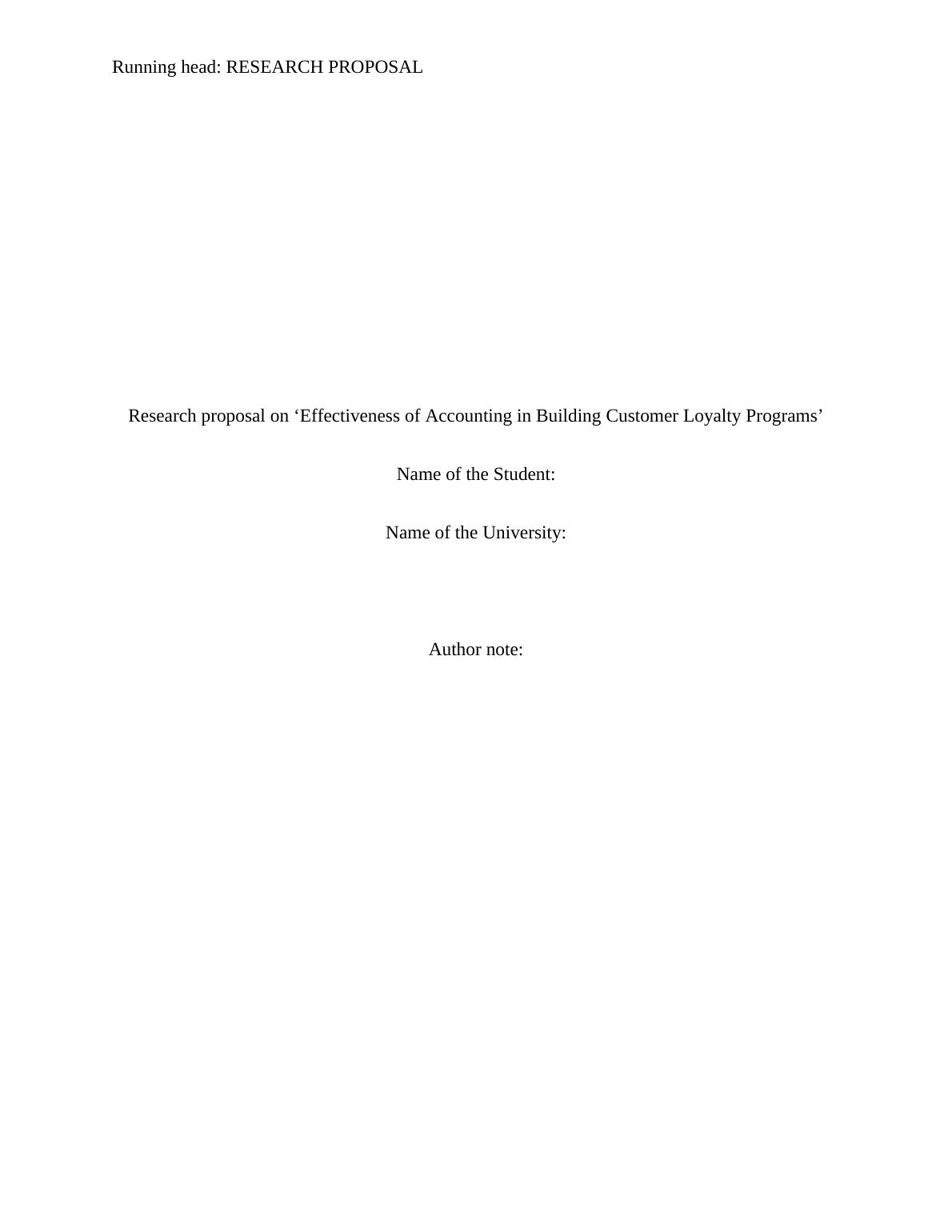
1RESEARCH PROPOSAL
Abstract
Customer loyalty programs are treated as significant marketing tool for the firms. It
measures the repeat purchase behavior of the customers and hence, the firms put much effort in
designing an efficient loyalty programs not only to retain the existing members but also to
increase the memberships for profitability in the future. This research proposal is aimed at
exploring the role and effectiveness of accounting in designing efficient customer loyalty
programs as these programs are considered as liability in the balance sheets of the firms. The
researcher will collect both primary and secondary data and apply both qualitative and
quantitative methods of analysis on the information to get an in-depth overview of the research
issue and evaluate the relationship between the research variable.
Research problem
Customer loyalty programs are an extremely useful way to retain the customers. Almost
every organization works towards designing an effective loyalty program which gives some extra
benefits for the loyal members to retain the existing customer base. Various extra benefits are
given in these programs to make these attractive and value for money for the customers in
comparison to the rivals in the market. Hence, a cost factor is in operation for the organizations
while designing the loyalty programs. Thus, the finance and accounts department of any
organization has a very crucial responsibility in designing the loyalty programs in a manner such
that, the profits of the organization does not get hampered, rather in the long term, it improves
and the size of the customer base increases. Although, there are many other factors that influence
the customer retention for an organization, some internal and some external, and loyalty
programs are one of those factors. It not only involves accounting but also involves strategic
marketing to attract the customers. At the same time, the accounting department plays a major
Abstract
Customer loyalty programs are treated as significant marketing tool for the firms. It
measures the repeat purchase behavior of the customers and hence, the firms put much effort in
designing an efficient loyalty programs not only to retain the existing members but also to
increase the memberships for profitability in the future. This research proposal is aimed at
exploring the role and effectiveness of accounting in designing efficient customer loyalty
programs as these programs are considered as liability in the balance sheets of the firms. The
researcher will collect both primary and secondary data and apply both qualitative and
quantitative methods of analysis on the information to get an in-depth overview of the research
issue and evaluate the relationship between the research variable.
Research problem
Customer loyalty programs are an extremely useful way to retain the customers. Almost
every organization works towards designing an effective loyalty program which gives some extra
benefits for the loyal members to retain the existing customer base. Various extra benefits are
given in these programs to make these attractive and value for money for the customers in
comparison to the rivals in the market. Hence, a cost factor is in operation for the organizations
while designing the loyalty programs. Thus, the finance and accounts department of any
organization has a very crucial responsibility in designing the loyalty programs in a manner such
that, the profits of the organization does not get hampered, rather in the long term, it improves
and the size of the customer base increases. Although, there are many other factors that influence
the customer retention for an organization, some internal and some external, and loyalty
programs are one of those factors. It not only involves accounting but also involves strategic
marketing to attract the customers. At the same time, the accounting department plays a major
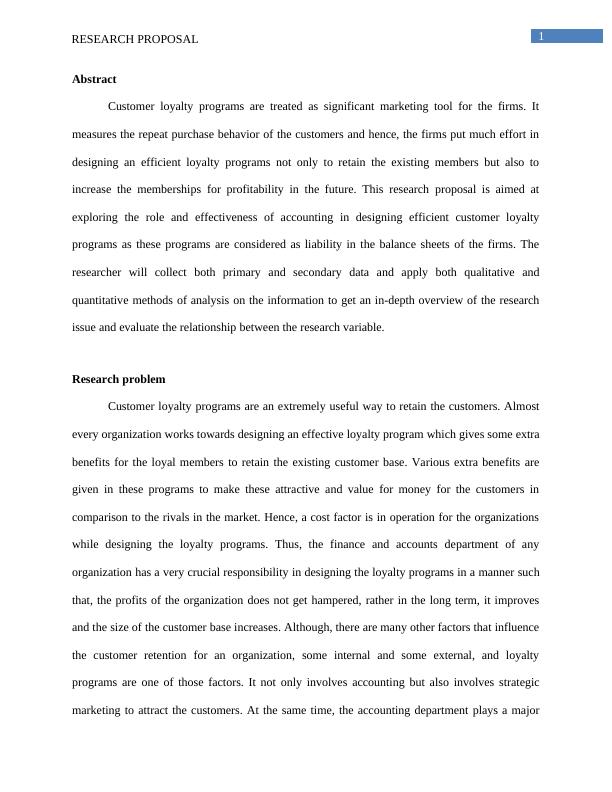
2RESEARCH PROPOSAL
role in handling the business and financial operations of an organization. Other than the overall
financial and accounting operations for handling the finance of the company, the finance
department also supervises and controls the marketing cost and other price related benefits given
by the company. Thus, the problem for this research study is to explore the effectiveness of the
accounting department in designing an effective loyalty programs for the organization which not
only will benefit the loyal customers financially but also will benefit the organization to retain its
customers and increase its customer base, which will increase profit in the long term.
Research questions and hypothesis
The research questions are:
1) What are the effective elements of customer loyalty programs that help in customer
retention?
2) How the accounting department or operations can improve the financial aspects of loyalty
programs?
3) In what ways the accounting can help in designing the loyalty programs for an
organization that would help in retaining the customers?
The research hypothesis is:
H0 (null hypothesis): Accounting does not have any significant impact on designing effective
customer loyalty program for Coles, Australia
H1 (Alternate hypothesis): Accounting has significant impact on designing effective customer
loyalty program for Coles, Australia
role in handling the business and financial operations of an organization. Other than the overall
financial and accounting operations for handling the finance of the company, the finance
department also supervises and controls the marketing cost and other price related benefits given
by the company. Thus, the problem for this research study is to explore the effectiveness of the
accounting department in designing an effective loyalty programs for the organization which not
only will benefit the loyal customers financially but also will benefit the organization to retain its
customers and increase its customer base, which will increase profit in the long term.
Research questions and hypothesis
The research questions are:
1) What are the effective elements of customer loyalty programs that help in customer
retention?
2) How the accounting department or operations can improve the financial aspects of loyalty
programs?
3) In what ways the accounting can help in designing the loyalty programs for an
organization that would help in retaining the customers?
The research hypothesis is:
H0 (null hypothesis): Accounting does not have any significant impact on designing effective
customer loyalty program for Coles, Australia
H1 (Alternate hypothesis): Accounting has significant impact on designing effective customer
loyalty program for Coles, Australia
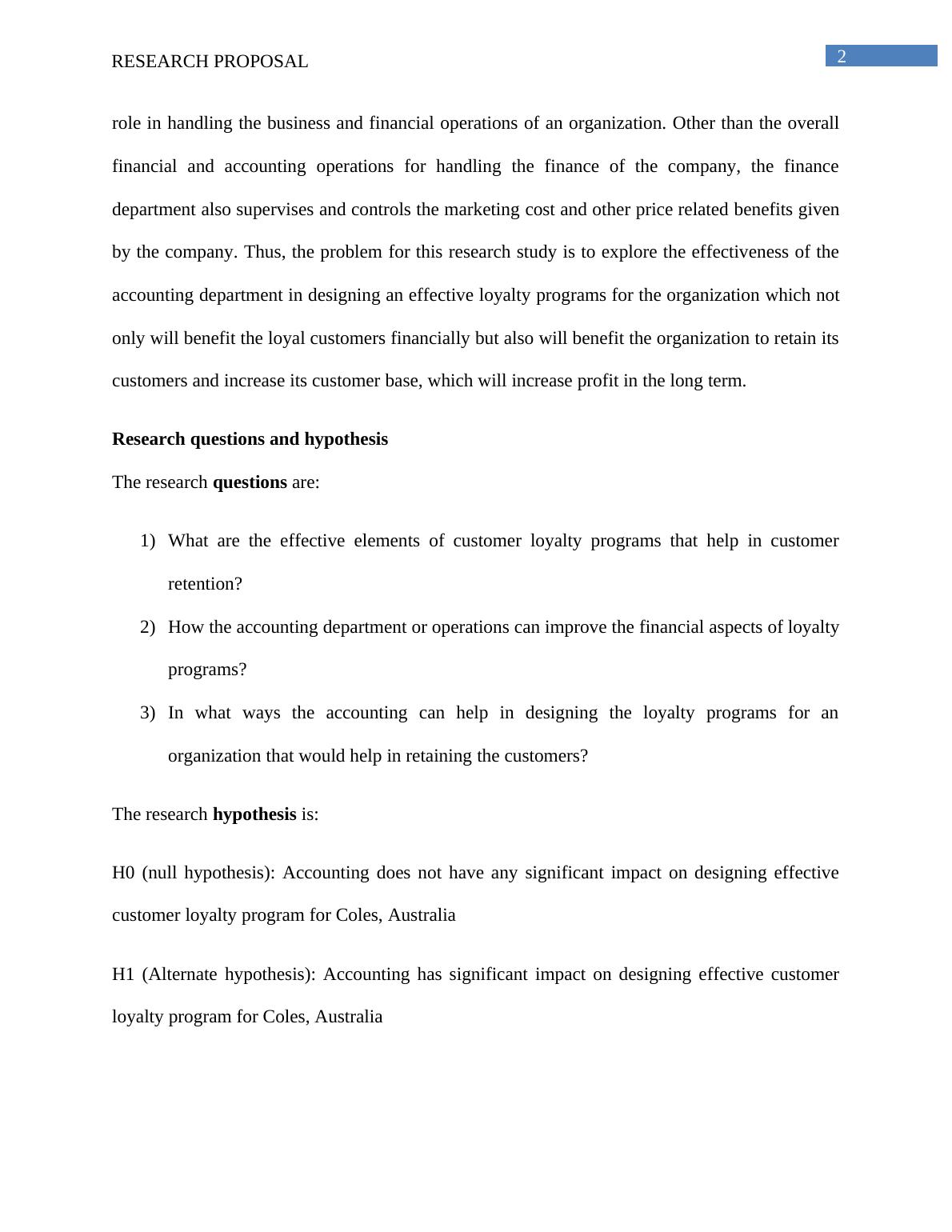
3RESEARCH PROPOSAL
Delimitations and limitations
Delimitations are those that are set by the researchers to create boundaries and conduct
the study effectively, while limitations are those factors that cannot be set or controlled by the
researchers but these affect the efficiency of the study. The delimitations of the study are that the
researcher will choose a case study organization to address the research questions in an in-depth
manner. Case study helps in addressing the research problem in a real-world scenario and that is
beneficial to have feasible practical solutions or recommendations for the research problem
(Ross, 2017). Coles will be chosen as the case study organization. On the other hand, limitations
of the study are time and budget, for which the researcher will be able to study only one case
study organization, that is, Coles and the sample size will also be taken smaller due to these
limitations of time and budget.
Background
Significance of the research
Loyalty programs refers to the marketing tool that is used by almost all types of
organizations in different industries for motivating the repeat customers by offering them some
type of rewards generating from the purchase of products or services from the particular
organizations (Söderlund and Colliander, 2015). The system of loyalty programs were dominant
in the US retail and restaurant chains and the now the practice has been adopted by majority of
the organizations in different countries. Due to the prevalence of the customer loyalty programs,
majorly the customers expect some kind of bribed loyalty offer. As stated by McCall and
McMahon (2016), the customer loyalty program represents a structured and long term
promotional effort that provides incentives to the repeat consumers demonstrating loyal behavior
Delimitations and limitations
Delimitations are those that are set by the researchers to create boundaries and conduct
the study effectively, while limitations are those factors that cannot be set or controlled by the
researchers but these affect the efficiency of the study. The delimitations of the study are that the
researcher will choose a case study organization to address the research questions in an in-depth
manner. Case study helps in addressing the research problem in a real-world scenario and that is
beneficial to have feasible practical solutions or recommendations for the research problem
(Ross, 2017). Coles will be chosen as the case study organization. On the other hand, limitations
of the study are time and budget, for which the researcher will be able to study only one case
study organization, that is, Coles and the sample size will also be taken smaller due to these
limitations of time and budget.
Background
Significance of the research
Loyalty programs refers to the marketing tool that is used by almost all types of
organizations in different industries for motivating the repeat customers by offering them some
type of rewards generating from the purchase of products or services from the particular
organizations (Söderlund and Colliander, 2015). The system of loyalty programs were dominant
in the US retail and restaurant chains and the now the practice has been adopted by majority of
the organizations in different countries. Due to the prevalence of the customer loyalty programs,
majorly the customers expect some kind of bribed loyalty offer. As stated by McCall and
McMahon (2016), the customer loyalty program represents a structured and long term
promotional effort that provides incentives to the repeat consumers demonstrating loyal behavior
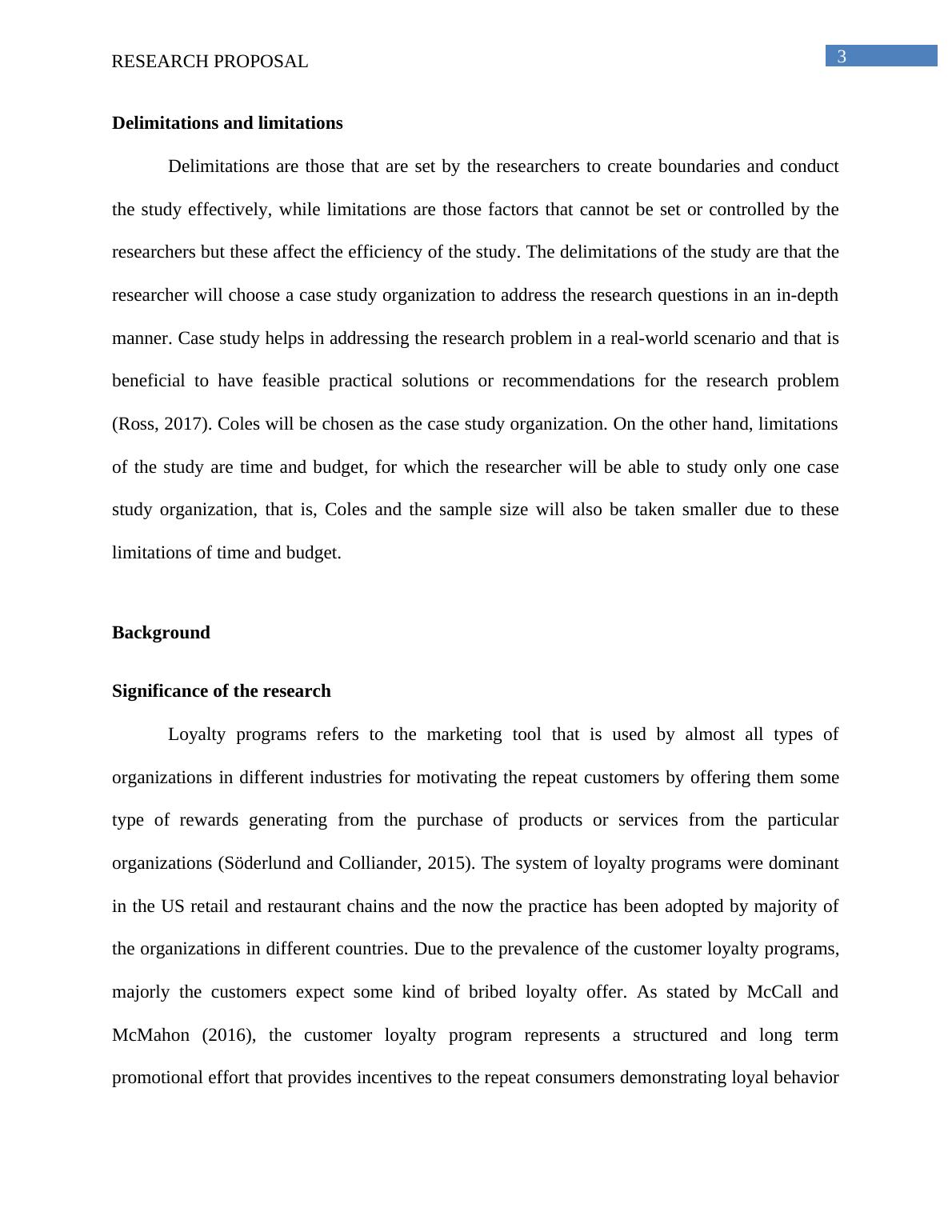
4RESEARCH PROPOSAL
towards the brand or organization. The main purpose of the loyalty programs is to motivate the
customers in a way so that they shun the competitors and return to the brand or organization and
in retail or food businesses, the rewards mostly consists of monetary and non-monetary benefits,
such as, discounts, special offers, freebies, redeemable points, etc. (Steinhoff and Palmatier,
2016). Thus, it can be said that, over the years, to execute this marketing technique successfully,
the organizations has involved the financial and accounting departments for efficiently designing
the loyalty programs as it involves a substantial amount of funding for implementing the
marketing tool and hence, the financial resources must be used efficiently and return on
investment is necessary for generating profit in the long term. Thus, it can be said that
accounting activities or the departments play a significant role in resource allocation for the
various marketing activities, such as, loyalty programs and many others (Schaltegger and Burritt,
2017).
Thus, the significance of the study lies in two aspects. Firstly, the study will make
important contribution in the academic world through research on the effectiveness of the
accounting operations, especially in the context of loyalty programs, which is one type of
marketing technique of any organization. The study will highlight the impact of the accounting
operations on the marketing technique, such as, loyalty programs, which aims to provide various
extra monetary and non-monetary benefits to the customers. Secondly, the study will provide
important insight to the managers and accountants of a business which will benefit while
designing the loyalty programs appropriately for the business.
towards the brand or organization. The main purpose of the loyalty programs is to motivate the
customers in a way so that they shun the competitors and return to the brand or organization and
in retail or food businesses, the rewards mostly consists of monetary and non-monetary benefits,
such as, discounts, special offers, freebies, redeemable points, etc. (Steinhoff and Palmatier,
2016). Thus, it can be said that, over the years, to execute this marketing technique successfully,
the organizations has involved the financial and accounting departments for efficiently designing
the loyalty programs as it involves a substantial amount of funding for implementing the
marketing tool and hence, the financial resources must be used efficiently and return on
investment is necessary for generating profit in the long term. Thus, it can be said that
accounting activities or the departments play a significant role in resource allocation for the
various marketing activities, such as, loyalty programs and many others (Schaltegger and Burritt,
2017).
Thus, the significance of the study lies in two aspects. Firstly, the study will make
important contribution in the academic world through research on the effectiveness of the
accounting operations, especially in the context of loyalty programs, which is one type of
marketing technique of any organization. The study will highlight the impact of the accounting
operations on the marketing technique, such as, loyalty programs, which aims to provide various
extra monetary and non-monetary benefits to the customers. Secondly, the study will provide
important insight to the managers and accountants of a business which will benefit while
designing the loyalty programs appropriately for the business.
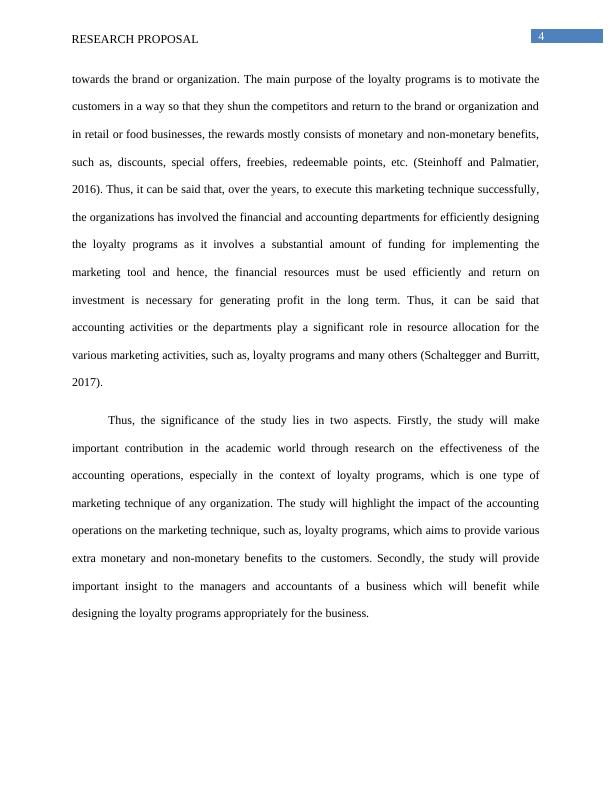
5RESEARCH PROPOSAL
Ethical considerations
Similar to any other research studies, this research study will also have some ethical
considerations. Firstly, the originality of the paper will be strictly maintained, as plagiarism is a
serious offence in the academic world, hence, all the information should be correctly cited.
Secondly, informed consent must be taken from the organization and the participants who would
take part in the primary data collection process. The purpose and objective of the study should be
clearly conveyed to the organization and it should also be mentioned that the data will be used
only for educational purpose. Thirdly, data confidentiality and anonymity will be maintained, the
information will be stored in the university database, and no personal information will be
collected from the participants. Fourthly, the participants will have voluntary participation
choice, that is, no one will be forced or bribed to participate in the data collection process, and
they can withdraw at any point of time. Thus, the above ethical considerations will be addressed
by the researcher while conducting the study.
Literature review
Loyalty programs and their impact
Loyalty program is one of the major marketing tools of the companies. It is meant to
enhance the loyalty behavior of the customers. By loyalty behavior, the repeat purchasing
behavior of the customers is referred to. In other words, when a customer comes back to a
particular store or brand for purchasing goods and services, it is termed as loyalty of the
customers. It is a matter of concern for the companies that whether the loyalty programs are
effective in enhancing the loyalty of the consumers towards the products or services of that
particular organization. These programs are designed to influence the existing customers and
Ethical considerations
Similar to any other research studies, this research study will also have some ethical
considerations. Firstly, the originality of the paper will be strictly maintained, as plagiarism is a
serious offence in the academic world, hence, all the information should be correctly cited.
Secondly, informed consent must be taken from the organization and the participants who would
take part in the primary data collection process. The purpose and objective of the study should be
clearly conveyed to the organization and it should also be mentioned that the data will be used
only for educational purpose. Thirdly, data confidentiality and anonymity will be maintained, the
information will be stored in the university database, and no personal information will be
collected from the participants. Fourthly, the participants will have voluntary participation
choice, that is, no one will be forced or bribed to participate in the data collection process, and
they can withdraw at any point of time. Thus, the above ethical considerations will be addressed
by the researcher while conducting the study.
Literature review
Loyalty programs and their impact
Loyalty program is one of the major marketing tools of the companies. It is meant to
enhance the loyalty behavior of the customers. By loyalty behavior, the repeat purchasing
behavior of the customers is referred to. In other words, when a customer comes back to a
particular store or brand for purchasing goods and services, it is termed as loyalty of the
customers. It is a matter of concern for the companies that whether the loyalty programs are
effective in enhancing the loyalty of the consumers towards the products or services of that
particular organization. These programs are designed to influence the existing customers and
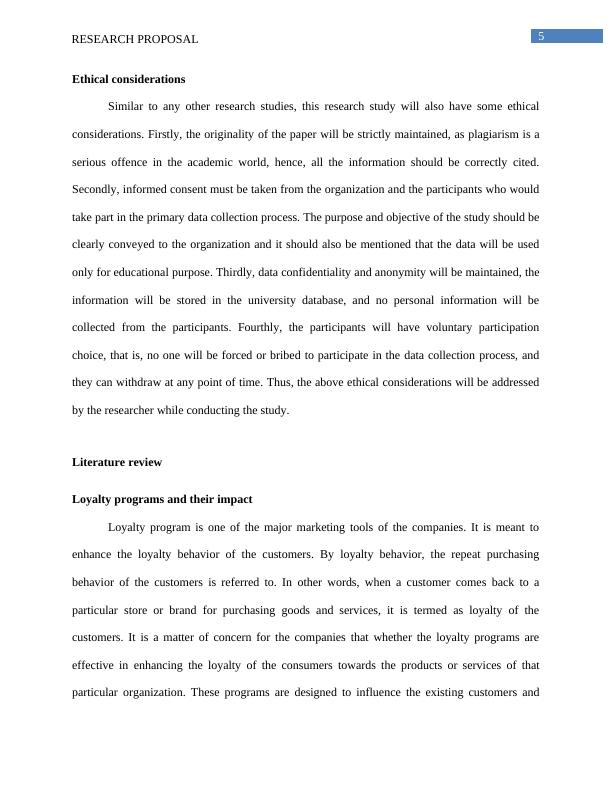
End of preview
Want to access all the pages? Upload your documents or become a member.
Related Documents
Effectiveness of Accounting in Building Customer Loyaltylg...
|6
|387
|498
A Case Study on Iceland Londonlg...
|16
|4982
|188
Effectiveness of Loyalty Programs in Brand Management: A Case Study of Sofitel Sydney Wentworthlg...
|4
|716
|212
Decision-Making in Integrated Business Management Systemslg...
|11
|3005
|280
Introduction to Customer Relationship Managementlg...
|16
|1194
|60
Consumer Behavior Assignment: Tescolg...
|13
|3458
|33
